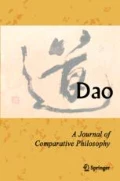Abstract
This essay studies equality and inequality in Confucianism. By studying Confucius, Mencius, Xunzi, and other classic thinkers, I argue that Confucian equality is manifested in two forms. Numerical equality is founded in the Mencian belief that every person is born with the same moral potential and the Xunzian notion that all people have the same xing and the same potential for moral cultivation. It is also manifested in the form of role-based equality. Proportional equality, however, is the main notion of equality in Confucian philosophy. Proportional equality is realized in moral, economic, and political realms. On the basis of these notions of Confucian equality, I propose two Confucian political principles for contemporary society. The first is the inclusive principle of general election by citizenry, and the second is the exclusive principle of qualification for public offices.
Similar content being viewed by others
References
Aristotle. 1962. Nicomachean Ethics. New York: The Bobbs-Merrill Company, Inc.
Bell, Daniel. 2006. Beyond Liberal Democracy: Political Thinking for an East Asian Context. Princeton NJ.: Princeton University Press.
Caplan, Bryan. 2006. “The Myth of the Rational Voter,” online essay at http://www.catounbound.org/2006/11/06/bryan-caplan/the-myth-of-the-rational-voter/
Caplan, Bryan. 2007. The Myth of the Rational Voter: Why Democracies Choose Bad Policies. Princeton, NJ.: Princeton University Press.
Chan, Joseph (2007). “Democracy and Meritocracy: Toward a Confucian Perspective.” Journal of Chinese Philosophy 34:2: 179–193.
Darwall, Stephen. 1977. “Two Kinds of Respect.” Ethics 88: 36–49.
Davis, Kingsley, and Wilbert Moore. 1944. “Some Principles of Stratification.” American Sociological Review 10:2: 242–249.
Frankfurt, Harry. 1997. “Equality and Respect.” Social Research 64.1: 5–15.
Hall, David, and Roger Ames. 1999. The Democracy of the Dead. Chicago and Lasalle, IL: Open Court.
Herr, Ranjoo S. 2010. “Confucian Democracy and Equality.” Asian Philosophy 20.3: 261–282.
Hsiao, Kung-ch’uan 蕭公權. 1998. A History of Chinese Political Thought 中國政治思想史. Shenyang 沈陽: Liaoning Jiaoyu Chubanshev 遼寧教育出版社.
Knoblock, John. 1988. Xunzi: A Translation and Study of the Complete Works: Vol. I, Books 1–6. Palo Alto, CA: Stanford University Press.
_____. 1990. Xunzi: A Translation and Study of the Complete Works: Vol. II, Books 7–16. Palo Alto, CA: Stanford University Press.
Kongzi Jiayu 孔子家語 (Confucius’s Family Teachings). 2003. Beijing: Zhongguo Wenshi Chubanshe 中國文史出版社.
Li, Chenyang. 2009. “Where Does Confucian Virtuous Leadership Stand?—A Critique of Daniel Bell’s Beyond Liberal Democracy,” Philosophy East & West 59.4: 531–536.
_____. 2012. “Democratic Form and Confucian Substance.” In Chinese Philosophy and Culture 中國哲學與文化 10. Hong Kong: The Chinese University of Hong Kong.
Lin, Yutang. 1937. The Importance of Living. New York: Quill.
Mencius. 1970. Translation with an introduction by D.C. Lau. Baltimore, MD: Penguin Books.
Munro, Donald. 1969. The Concept of Man in Early China. Palo Alto, CA: Stanford University Press.
Nuyen, A. T. 2001. “Confucianism and the Idea of Equality.” Asian Philosophy 11.2: 61–71.
Rousseau, Jean-Jacques. 1986. The First and Second Discourses and Essay on the Origin of Languages. Trans. By Victor Gourevitch, New York: Harper & Row, Publishers.
Tan, Sor-hoon. 2003. Confucian Democracy. Albany, NY: State University of New York Press.
TTC (Thirteen Classics with Commentaries 十三經注疏). 1985 . Beijing: Zhongguo Shudian 中國書店.
TTM (Twenty-two Masters 二 十 二 子. 1986. Shanghai 上海: Shanghai Guji Chubanshe 上海古籍出版社.
Verba, Sidney. 2011. “Thoughts about Political Equality: What Is It? Why Do We Want It?” http://www.hks.harvard.edu/inequality/Summer/Summer01/papers/Verba.pdf.
Wang, Xianqian 王先谦. 1988. Collected Interpretations of the Xunzi 荀子集解. Beijing: Zhonghua Shuju 中華書局.
Yao, Silian 姚思廉. 1986. Chen Shu in Twenty-Five Histories 二十五史 (v. 3). Shanghai: Shanghai Guji Chubanshe 上海古籍出版社.
Zhu, Xi 朱熹. 1985. Four Books and Five Classics 四書五經 (Vol. A, B, C). Beijing: Zhongguo Shudian 中國書店.
Author information
Authors and Affiliations
Corresponding author
Rights and permissions
About this article
Cite this article
Li, C. Equality and Inequality in Confucianism. Dao 11, 295–313 (2012). https://doi.org/10.1007/s11712-012-9283-0
Published:
Issue Date:
DOI: https://doi.org/10.1007/s11712-012-9283-0




